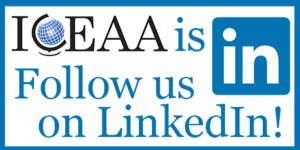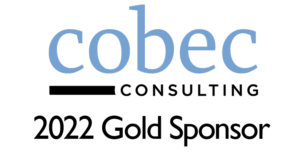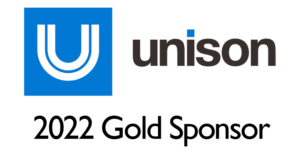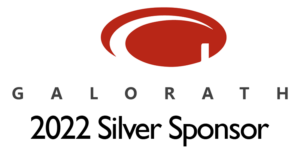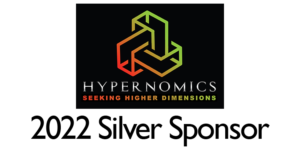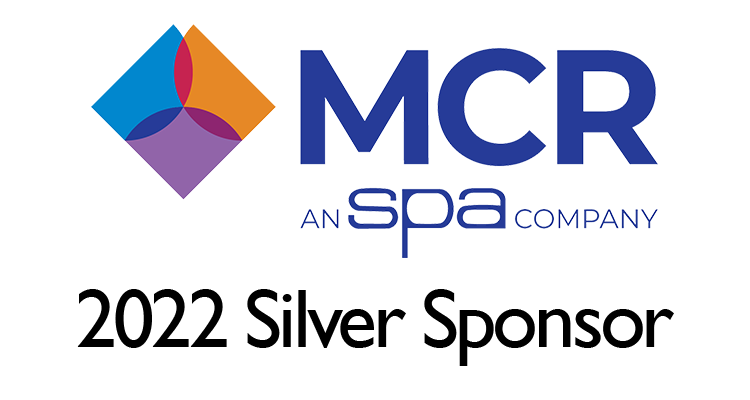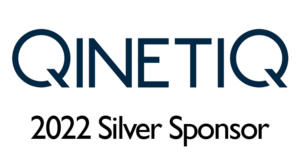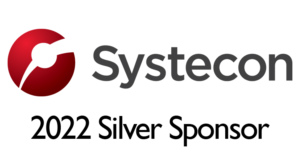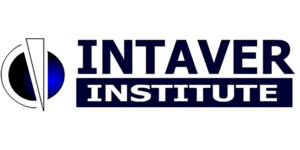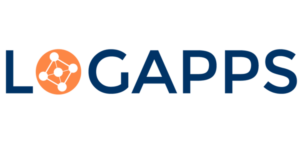ICEAA is excited to announce the next Professional Development & Training Workshop May 17-19, 2022 in Pittsburgh, PA! Join us for three days of thought-provoking general sessions, informative breakout sessions, and opportunities to connect with the companies that provide the tools and services that are so crucial to your line of work.
Registration Sponsorship Schedule Photos
Keynote Speakers Presentations CEBoK® Training Track Speaker Bios 2022 Best Paper Award Winners
The deadline to submit abstracts for the 2022 Professional Development & Training Workshop was November 2, 2021. Late abstracts may still be submitted, but will be considered once space on the schedule comes available as a result of cancellations or withdrawn entries from those received on time. To submit an abstract, visit https://www.iceaaonline.com/pit22cfp/
Follow us on social media for updates:
2022 Workshop Registration Rates:
The 2022 ICEAA Workshop is an in-person event only. Virtual attendance is not available.
| ICEAA Members | $1,095 |
| Non-Members* | $1,215 |
| ICEAA Member & Government Employee | $990 |
| Non-Member Government Employee* | $1,070 |
| For companies sending 5 or more paid registrants: | |
| 5+ Group Registrant ICEAA Members | $1,055 |
| 5+ Group Registrant Non-Members* | $1,160 |
Registration fee includes breakfast and lunch for Tuesday, Wednesday, and Thursday. Evening networking receptions on Tuesday and Wednesday will feature light hors d’oeuvres but dinner is not served.
Attendees of the ICEAA Professional Development & Training Workshop will have access to four hours of thought-provoking presentations in general sessions and 36 hours of concurrent breakout training and professional papers presentations. Individuals are free to determine their own schedule and do not need to indicate in advance which sessions or tracks they plan to attend.
Attendees who register at a non-member rate will receive a coupon code after the conclusion of the Workshop to use for a complimentary year of ICEAA membership. Attendees will be instructed how to log into their ICEAA profiles to activate their free membership; the membership will not be automatically applied to your account.
COVID-19 Policies:
ICEAA will adhere to the Commonwealth of Pennsylvania’s rules and regulations for mask wearing and enforcement: https://www.health.pa.gov/topics/disease/coronavirus/Pages/Coronavirus.aspx
These policies are in place as of April 1, 2022. Should recommendations or local laws/regulations change, this page will be updated and registered attendees notified.
Cancellation Policies:
Refund requests made before April 1, 2022: Full refund, less a $50 refund fee.
Refund requests made April 2-May 2, 2022: 50% refund.
On or after May 3, 2022: No refund.
Substitutions can be made at any time with no charge. Email iceaa@iceaaonline.org to transfer your registration.
Join our list of sponsors and exhibitors!
ICEAA’s 2022 Professional Development & Training Workshop exhibit hall will be open for over 30 hours, with 8 hours on the Workshop schedule dedicated for attendees to visit our exhibitors. The limited number of available booths allows for a focused, consultative environment in which you can meet with current and future clients. Tuesday and Wednesday’s evening receptions, as well as food buffets and beverage breaks, will be served in the exhibit hall among the booths, providing ample time to develop leads. The exhibit hall is centrally located to the breakout session rooms and adjacent to the general session ballroom.
All exhibiting packages include:
- 8’ x 10‘ booth in exhibit hall with complimentary electrical line
- Pipe & drape, 6’ table, 2 chairs, wastebasket, janitorial services
- Listing in conference program, website, mobile app, and onsite signage
- Two complimentary full conference registrations
Download the 2022 Sponsoring & Exhibiting prospectus to review the array of exposure and and branding opportunities that will be available to you in Pittsburgh. Contact Megan Jones at megan@iceaaonline.org for inquiries.
Keynote Presentations
Tuesday, May 17
Think Differently to Lead Boldly!
Dr. Marina Theodotou
As the volume, velocity, and complexity of change continues to increase, how will you keep up? In this keynote, Dr. Marina Theodotou from the Defense Acquisition University will share three innovation mindset skills to help you think differently to lead boldly!
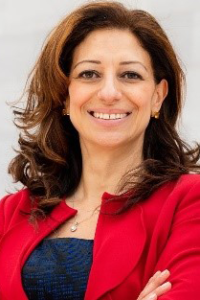 Dr. Marina Theodotou is an organizational change expert at the Defense Acquisition University, and the curator and host of the “Think Differently” webcast series which inspires and empowers the workforce to think differently, learn deliberately, and lead boldly. She recently completed a rotation as Director for Learning Experiences at NavalX at the United States Department of the Navy. Dr. Theodotou is an Assistant Professor at the Executive MBA Program at the Jack Welch Management Institute and a recognized thought leader in learning & development. Her articles and podcasts on learning ecosystems, innovation, and culture change have been published Harvard Business Review, Inc.com, eLearning Industry, Chief Learning Officer, the Association for Talent Development and Training Industry among others. Dr. Theodotou is a Lean Six Sigma Black Belt, and holds Master’s and Bachelor’s degrees in Economics from the University of South Carolina and a Doctorate in Organizational Change and Leadership from the University of Southern California. www.linkedin.com/in/marinatheodotou
Dr. Marina Theodotou is an organizational change expert at the Defense Acquisition University, and the curator and host of the “Think Differently” webcast series which inspires and empowers the workforce to think differently, learn deliberately, and lead boldly. She recently completed a rotation as Director for Learning Experiences at NavalX at the United States Department of the Navy. Dr. Theodotou is an Assistant Professor at the Executive MBA Program at the Jack Welch Management Institute and a recognized thought leader in learning & development. Her articles and podcasts on learning ecosystems, innovation, and culture change have been published Harvard Business Review, Inc.com, eLearning Industry, Chief Learning Officer, the Association for Talent Development and Training Industry among others. Dr. Theodotou is a Lean Six Sigma Black Belt, and holds Master’s and Bachelor’s degrees in Economics from the University of South Carolina and a Doctorate in Organizational Change and Leadership from the University of Southern California. www.linkedin.com/in/marinatheodotou
Wednesday, May 18
Cost Analysis and the Art of the Possible
Krystyna M. A. Kolesar
A successful professional career is typically a winding road of opportunity — making and taking — relying on your own compass. The knowledge, skills and abilities (technical AND interpersonal) are required for success in the cost analysis field – this foundation can pave the way for many challenging, meaningful career opportunities in other fields. In this keynote, Ms. Krystyna Kolesar from the Department of Army will share her thoughts on career progression through the lens of her personal career experience.
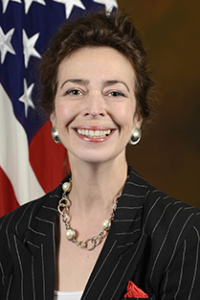 Selected to the Senior Executive Service in November 2003, Ms. Krystyna Kolesar assumed her present position as the United States Army’s Assistant Deputy Chief of Staff, G-8, in December 2020. She brings experience working for the U.S. Navy and the Office of the Secretary of Defense. In her current position, she is responsible for Army Programs, Force Development, and the Center for Army Analysis. In this capacity, she is the principal advisor to the G-8 with responsibility for providing professional advice to the G-8 on key issues to include formulating plans and programs, acquiring resources, developing communication networks, executing operations, and evaluating results.
Selected to the Senior Executive Service in November 2003, Ms. Krystyna Kolesar assumed her present position as the United States Army’s Assistant Deputy Chief of Staff, G-8, in December 2020. She brings experience working for the U.S. Navy and the Office of the Secretary of Defense. In her current position, she is responsible for Army Programs, Force Development, and the Center for Army Analysis. In this capacity, she is the principal advisor to the G-8 with responsibility for providing professional advice to the G-8 on key issues to include formulating plans and programs, acquiring resources, developing communication networks, executing operations, and evaluating results.
Thursday, May 19
Making your S Curves Actionable
Dr. Sam L. Savage
Just as electrification replaces technologies that use fossil fuels with those that use electricity, Chancification replaces computations based on deterministic numbers with those based on probability distributions. Just as non-experts can illuminate light bulbs with electricity generated by power engineers, Chancification allows everyday managers (even those suffering from Post Traumatic Statistics Disorder, PTSD) to make Chance-Informed Decisions based on data generated by experts using Monte Carlo Simulation. This also allows you to combine the results of simulations. For example, if you had an S Curve for Uncertain Cost per Unit, and another S Curve for Uncertain Demand, Chancification would allow you to “Multiply” the two S Curves together to create the S Curve for Total Cost.
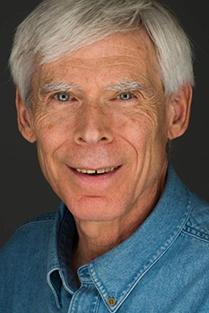 Dr. Sam L. Savage is author of The Flaw of Averages: Why We Underestimate Risk in the Face of Uncertainty (John Wiley & Sons, 2009, 2012), and Chancification: How to Fix the Flaw of Averages (2022). He is Executive Director of ProbabilityManagement.org, a 501(c)(3) nonprofit devoted to the communication and calculation of uncertainty. The organization has received funding from several large corporations, and Harry Markowitz, Nobel Laureate in Economics was a co-founding board member. Dr. Savage received his Ph.D. in computational complexity from Yale University, then began his career as a mathematician at the General Motors Research Laboratory. From there he taught at the University of Chicago Graduate School of Business before moving to Stanford. He is currently an Adjunct Professor in Civil and Environmental Engineering and is also a Fellow of the University of Cambridge Judge Business School. Throughout his career, Dr. Savage has consulted widely to industry and served as an expert in litigation. His writing reflects his experiences on both the academic and practical side of what he calls “The Algebraic Curtain separating Managers from Management Science.”
Dr. Sam L. Savage is author of The Flaw of Averages: Why We Underestimate Risk in the Face of Uncertainty (John Wiley & Sons, 2009, 2012), and Chancification: How to Fix the Flaw of Averages (2022). He is Executive Director of ProbabilityManagement.org, a 501(c)(3) nonprofit devoted to the communication and calculation of uncertainty. The organization has received funding from several large corporations, and Harry Markowitz, Nobel Laureate in Economics was a co-founding board member. Dr. Savage received his Ph.D. in computational complexity from Yale University, then began his career as a mathematician at the General Motors Research Laboratory. From there he taught at the University of Chicago Graduate School of Business before moving to Stanford. He is currently an Adjunct Professor in Civil and Environmental Engineering and is also a Fellow of the University of Cambridge Judge Business School. Throughout his career, Dr. Savage has consulted widely to industry and served as an expert in litigation. His writing reflects his experiences on both the academic and practical side of what he calls “The Algebraic Curtain separating Managers from Management Science.”
Thursday, May 19 – Closing General Session
The Evolution of Cost Estimating: How Data Science Has Influenced our Community and What’s Next
To close out our workshop with a celebration ICEAA’s ten-year anniversary, this panel will evaluate how the cost estimating and data science fields have evolved over the past decade, discuss the current challenges and opportunities in the intersection of the two fields, and postulate what the future might be. Our discussion will be moderated by cost estimating instructor, Tim Anderson, CCEA® and will feature expert leadership in the fields:
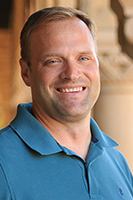 Isaac Faber has over ten years of experience developing and deploying data-focused solutions within the government and the private sector. He is currently the director of AI development at the U.S. Army’s AI Center and the lead architect and project manager for the Army’s next-generation artificial intelligence and data science development platform. Faber received a Ph.D. in decision and risk analysis from Stanford University.
Isaac Faber has over ten years of experience developing and deploying data-focused solutions within the government and the private sector. He is currently the director of AI development at the U.S. Army’s AI Center and the lead architect and project manager for the Army’s next-generation artificial intelligence and data science development platform. Faber received a Ph.D. in decision and risk analysis from Stanford University.
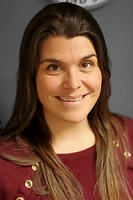 Katie Geier Noreiga is the Director of the Cost Analysis Division within the Office of the Chief Financial Officer. In this role Ms. Noreiga oversees the cost analysis function for the Department of Homeland Security. She is responsible for providing objective cost estimates and cost analyses to enable DHS acquisition and resource decision making. This includes principally advising the Under Secretary for Management, Chief Financial Officer, and Component Acquisition Executives on cost estimating and analysis issues; leading the Department in cost estimating and analysis policy, policy implementation, and guidance; developing Independent Cost Estimates (ICEs) and Assessments (ICAs) for major acquisition programs to inform the Acquisition Decision Authority; and advising the Homeland Security Acquisition Institute (HSAI) on career field certification, training, and education for the cost estimating and analysis community. Ms. Noreiga is also responsible for the development and implementation of a department-wide business intelligence tool, the Unified View of Investments, that provides a centralized and authoritative view of the DHS major acquisition program portfolio. Ms. Noreiga has been with DHS since 2009 serving in various roles throughout the acquisition community. Prior to joining DHS, Ms. Noreiga worked for the Navy Engineering Logistics Office for six years where she obtained vast experience estimating weapon systems for various platforms. Ms. Noreiga holds a B.S. in Industrial Engineering from The Pennsylvania State University (2002) and a M.B.A. from The George Washington University (2007). She is certified Level III for the Business, Cost Estimating and Financial Management career field. Ms. Noreiga resides in Davidsonville, MD with her husband and two daughters.
Katie Geier Noreiga is the Director of the Cost Analysis Division within the Office of the Chief Financial Officer. In this role Ms. Noreiga oversees the cost analysis function for the Department of Homeland Security. She is responsible for providing objective cost estimates and cost analyses to enable DHS acquisition and resource decision making. This includes principally advising the Under Secretary for Management, Chief Financial Officer, and Component Acquisition Executives on cost estimating and analysis issues; leading the Department in cost estimating and analysis policy, policy implementation, and guidance; developing Independent Cost Estimates (ICEs) and Assessments (ICAs) for major acquisition programs to inform the Acquisition Decision Authority; and advising the Homeland Security Acquisition Institute (HSAI) on career field certification, training, and education for the cost estimating and analysis community. Ms. Noreiga is also responsible for the development and implementation of a department-wide business intelligence tool, the Unified View of Investments, that provides a centralized and authoritative view of the DHS major acquisition program portfolio. Ms. Noreiga has been with DHS since 2009 serving in various roles throughout the acquisition community. Prior to joining DHS, Ms. Noreiga worked for the Navy Engineering Logistics Office for six years where she obtained vast experience estimating weapon systems for various platforms. Ms. Noreiga holds a B.S. in Industrial Engineering from The Pennsylvania State University (2002) and a M.B.A. from The George Washington University (2007). She is certified Level III for the Business, Cost Estimating and Financial Management career field. Ms. Noreiga resides in Davidsonville, MD with her husband and two daughters.
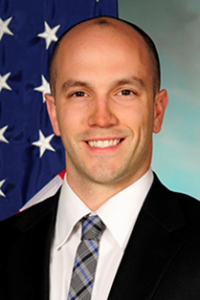 Daniel Germony is an Operations Research Analyst with 13 years of experience working in the Department of Defense (DoD). Currently, Mr. Germony works in the Office of Secretary of Defense (OSD) – Cost Assessment Program Evaluation (CAPE) Office as the lead for Operations & Support (O&S) data transformation in support of CAPE’s Enterprise Visibility and Management of Operating and Support Costs (EVAMOSC) system. Mr. Germony is also leading CAPE’s efforts to improve access to data science tools and methods for DoD’s cost community and is heavily involved in the policy development and execution of cost data collection efforts. Before working at CAPE, Mr. Germony was the Senior Data Scientist at US Army TACOM’s Cost & System Analysis Office where he oversaw development of advanced cost analysis tools and trained new analysis on data analysis best practices. Mr. Germony has a Masters in Cost Estimating and Analysis from the Naval Postgraduate School and a Bachelor’s degree in Economics from the University of Michigan.
Daniel Germony is an Operations Research Analyst with 13 years of experience working in the Department of Defense (DoD). Currently, Mr. Germony works in the Office of Secretary of Defense (OSD) – Cost Assessment Program Evaluation (CAPE) Office as the lead for Operations & Support (O&S) data transformation in support of CAPE’s Enterprise Visibility and Management of Operating and Support Costs (EVAMOSC) system. Mr. Germony is also leading CAPE’s efforts to improve access to data science tools and methods for DoD’s cost community and is heavily involved in the policy development and execution of cost data collection efforts. Before working at CAPE, Mr. Germony was the Senior Data Scientist at US Army TACOM’s Cost & System Analysis Office where he oversaw development of advanced cost analysis tools and trained new analysis on data analysis best practices. Mr. Germony has a Masters in Cost Estimating and Analysis from the Naval Postgraduate School and a Bachelor’s degree in Economics from the University of Michigan.
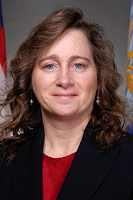 Ranae P. Woods, a Senior Level executive, is the Technical Director for Cost and Economic Analysis Research, Air Force Cost Analysis Agency, Deputy Assistant Secretary for Cost and Economics, Office of the Assistant Secretary of the Air Force for Financial Management and Comptroller, Washington, D.C. As the senior Air Force cost and economics technical leader, she provides strategic and professional leadership in the development of highly complex major weapon system program cost estimates, studies, and models, influencing multi-billion dollar Air Force acquisition, budget and programming decisions. She directs the Air Force wide cost research program to improve cost and economic analysis databases, methods and tools, and is responsible for the creation of policy, regulations, standards, guidance, and training to enhance workforce skills. Ms. Woods began her career as a cost analyst and industrial engineer in the Navy Cost Analysis Intern Program for the Naval Center for Cost Analysis where she supported the development of cost estimates for a wide variety of Navy weapon systems. Since 1993, she has held a wide variety of cost analysis positions within the Air Force as well as a career broadening position within the Office of the Deputy Chief of Staff, Strategic Plans and Programs. Ms. Woods has a Bachelor of Science in industrial engineering from Pennsylvania State University, a MBA from Virginia Polytechnic Institute and State University, and a Master’s degree in National Resource Strategy from the Industrial College of the Armed Forces (ICAF). She is a Department of Defense certified acquisition level III professional in business cost estimating.
Ranae P. Woods, a Senior Level executive, is the Technical Director for Cost and Economic Analysis Research, Air Force Cost Analysis Agency, Deputy Assistant Secretary for Cost and Economics, Office of the Assistant Secretary of the Air Force for Financial Management and Comptroller, Washington, D.C. As the senior Air Force cost and economics technical leader, she provides strategic and professional leadership in the development of highly complex major weapon system program cost estimates, studies, and models, influencing multi-billion dollar Air Force acquisition, budget and programming decisions. She directs the Air Force wide cost research program to improve cost and economic analysis databases, methods and tools, and is responsible for the creation of policy, regulations, standards, guidance, and training to enhance workforce skills. Ms. Woods began her career as a cost analyst and industrial engineer in the Navy Cost Analysis Intern Program for the Naval Center for Cost Analysis where she supported the development of cost estimates for a wide variety of Navy weapon systems. Since 1993, she has held a wide variety of cost analysis positions within the Air Force as well as a career broadening position within the Office of the Deputy Chief of Staff, Strategic Plans and Programs. Ms. Woods has a Bachelor of Science in industrial engineering from Pennsylvania State University, a MBA from Virginia Polytechnic Institute and State University, and a Master’s degree in National Resource Strategy from the Industrial College of the Armed Forces (ICAF). She is a Department of Defense certified acquisition level III professional in business cost estimating.
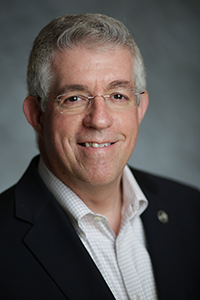 Moderator: Timothy P. Anderson, CCEA® is the Director of the Integrated Cost and Schedule Analysis Department at The Aerospace Corporation, and a professional cost analyst with over 28 years’ experience. Mr. Anderson has a B.S. in Industrial and Operations Engineering from the University of Michigan, and an M.S. in Operations Research from the Naval Postgraduate School. He is an ICEAA certified cost estimator/analyst, former board member of the Washington Capital Area chapter of ICEAA, and current regional director of the International ICEAA organization. He is also a part-time lecturer in the Systems Engineering and Operations Research departments of the Naval Postgraduate School.
Moderator: Timothy P. Anderson, CCEA® is the Director of the Integrated Cost and Schedule Analysis Department at The Aerospace Corporation, and a professional cost analyst with over 28 years’ experience. Mr. Anderson has a B.S. in Industrial and Operations Engineering from the University of Michigan, and an M.S. in Operations Research from the Naval Postgraduate School. He is an ICEAA certified cost estimator/analyst, former board member of the Washington Capital Area chapter of ICEAA, and current regional director of the International ICEAA organization. He is also a part-time lecturer in the Systems Engineering and Operations Research departments of the Naval Postgraduate School.
Photos & Attendee Headshots
Photos by Carrie Evans unless otherwise noted. All photos are available for private use; please credit the photographer if used publicly or for business purposes.
To request a high-resolution version of any photo, or if you took photos at the Workshop you’d like to share with us, please email ICEAA.
Attendee Headshots: https://carrieevansphoto.smugmug.com/event/ICEAA-Headshots/ICEAA-Headshots/bkWrRV
Day 1: https://carrieevansphoto.smugmug.com/event/ICEAA-Day-1/ICEAA-Day-1/KbBwj2
Day 2: https://carrieevansphoto.smugmug.com/event/ICEAA-DAY-2/ICEAA-DAY-2/88jVQd
Day 3: https://carrieevansphoto.smugmug.com/event/ICEAA-DAY-3/ICEAA-DAY-3/zrjXWB
Contact Carrie Evans to inquire about Photoshop services for enhancing your head shot!
Schedule
![]() Attending the ICEAA Professional Development & Training Workshop earns a minimum of 2 points towards CCEA recertification. Additional points can be claimed for individual sessions attended by completing a form after the Workshop.
Attending the ICEAA Professional Development & Training Workshop earns a minimum of 2 points towards CCEA recertification. Additional points can be claimed for individual sessions attended by completing a form after the Workshop.
Outline Schedule
Tuesday
Breakfast buffet available • 7:00 – 8:00
Best Paper Awards & Keynote Presentation • 8:00 – 9:30
Papers • 9:45 – 11:45
Lunch • 11:45 – 12:45
Training/Papers • 12:45 – 4:45
Welcome Reception • 4:45 – 7:00
Wednesday
Breakfast buffet available • 7:00 – 8:00
Association Awards & Keynote Presentation • 8:00 – 9:45
Training/Papers • 10:15 – 12:00
Lunch • 12:00 – 1:15
Training/Papers • 1:15 – 5:15
Attendee Reception • 5:15 – 7:00
Thursday
Breakfast buffet available • 7:00 – 8:00
Keynote Presentation • 8:00 – 9:00
Training/Papers • 9:15 – 11:00
Best Paper General Session • 11:15 – 12:00
Lunch • 12:00 – 1:15
Training/Papers • 1:15 – 3:00
Closing General Session • 3:15 – 4:30
Workshop Ends • 4:30
Enjoy Pittsburgh!
2022 Best Paper Awards
2022 Best Paper, Modeling & Analysis Category -and- 2022 Best Paper Overall:
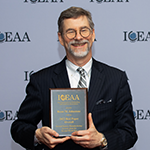 Second Source Manufacturing: Lessons from the Second World War
Second Source Manufacturing: Lessons from the Second World War
Brent M. Johnstone
Manufacturing defense systems at different sites is increasingly common due to foreign coproduction and international cooperative ventures. These situations challenge estimators, posing questions about the transfer of learning and relative efficiency of multiple production sites. This paper examines cost history from World War II, when U.S. bomber production lines were shared across multiple companies. The conclusions are tested against modern experience and guidance provided to estimators seeking help.
2022 Best Paper, Analytical Methods Category
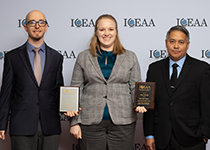 Using TRLs to Predict the Future of Nuclear Weapons
Using TRLs to Predict the Future of Nuclear Weapons
Abby Schendt, M. Michael Metcalf, Raymond Vera
Technology Readiness Levels (TRL) are used to measure and assess technology maturity. This paper presents innovative research demonstrating how historical TRL data can be used to perform credible, data-driven schedule analysis for programs early in development. Originally designed to help schedule analysis for the nuclear weapons stockpile, the resultant methodology combines historical milestone data and statistical methods to generate a Monte Carlo simulation of a risk-adjusted schedule for complex programs.
2022 Best Paper, Data Science + Machine Learning/NLP Category
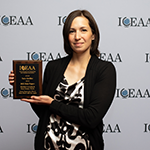 Linear Regression: How to Make What’s Old New Again
Linear Regression: How to Make What’s Old New Again
Kimberly Roye, Sara Jardine, Christian B. Smart
With the booming popularity of machine learning techniques, data scientists may have you believe there is no place for linear regression. Though many cost estimating applications are nonlinear, when there are linear relationships among features, ordinary least squares regression often performs better than the most powerful machine learning techniques. Scenarios for which linear regression should be chosen over more complicated algorithms are presented, as well as techniques such as regularization, gradient descent, and Bayesian methods.
2022 Best Paper, Management & Risk + Processes & Best Practices Category
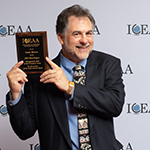 The BS in BoeS – Oh the Games that are Played
The BS in BoeS – Oh the Games that are Played
Sandy Burney
A good Basis of Estimate (BoE) uses a historical comparison, and a complexity factor. These two choices are not statistically based, meaning a bias is introduced into most BoEs. This paper explores the bias in BoEs through the framework of Game Theory. A BoE goes through a creation, internal review, internal approval, and external review process, where each player in this process will likely have a different payoff matrix. Each player in this process will want to insert their bias into the BoE, which this paper terms “Bias Selectivity” (BS).
2022 Best Paper, Software & Agile Category
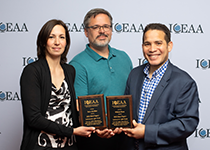 Let’s Go Agile: Data-Driven Agile Software Cost and Schedule Models Derived from DHS Projects
Let’s Go Agile: Data-Driven Agile Software Cost and Schedule Models Derived from DHS Projects
Wilson Rosa, Sara Jardine, Chad J. Lucas
This paper offers effort and schedule estimating models for agile software development projects using contractor backlog, monthly contract reports, and requirements documents. The regression models predict effort or schedule using six different sizing measures: Unadjusted Function Points, Simple Function Points, Functional Stories (Requirements), Issues, Stories, and Story Points. We also offer effort and schedule benchmarks. The analysis is based on data collected from 18 agile projects implemented within DHS and DoD between years 2014 to 2021.
2022 Best Paper, Trending Topics Category
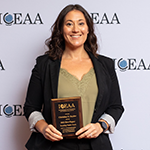 (CE)^2 : Communication and Empowerment for Cost Estimators
(CE)^2 : Communication and Empowerment for Cost Estimators
Christina N. Snyder
Too often, cost estimator training focuses solely on technical abilities, largely ignoring the “soft skills”. The behaviors of being a good communicator and empowering the team were shown in a 2020 ICEAA community survey to be important to cost leadership efficacy. Knowing that technical skills alone will only take estimators so far, this presentation leverages communication and empowerment training to demonstrate how all cost estimators can use soft skills to exponentially impact their analyses.



